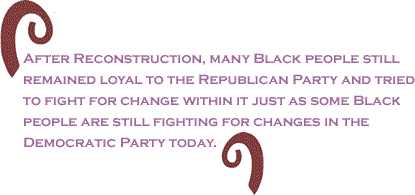
|
||||||||||||||||||||||
|
||||
 |
||||
| Since the end of the Civil War in 1865, when African Americans were granted the right to vote, through the 15th Amendment in 1868, electoral politics has played a dominant role in the African American Community. African Americans have been participating in electoral politics for 138 years.
This period in history from 1863 to 1876 is called �Reconstruction� and the first time Black people began to participate vigorously in electoral politics. During the late 1860s and early 1870s, many African Americans were elected to Congress and an African American Senator, Hiram Revels, was elected from Mississippi. The Political Abolition Party and the Equal Rights Party ran Frederick Douglass for Vice President of the United States in 1856 and 1872. Many Black colleges were established during this period through the land grant act that called for public education at the college level. Because of these responses on the part of the government many African American leaders felt that Black people�s situation could be resolved in America through governmental intervention and effective voting.
In a very close election, the South actually won the popular vote; however, during the Electoral College proceedings, neither candidate received a majority of electoral votes. The Southern representatives made it clear that their interests did not include winning the presidency of the United States, but reclaiming full autonomy for the South. Through much wrangling, a decision was made by those present that later became known as the �Great Compromise.� The Compromise of 1876 resulted in the Republican Hayes being announced the winner of the presidential election and both sides received what they basically wanted in the first place. Obviously neither side was interested in the liberation of Black people. The emerging northern industrialists wanted entry and new markets into the South and the southern plantation owners wanted their land back.
The net result for African Americans was the repealing of some of the voting rights laws that immediately began to wipe out Black elected officials and made it virtually impossible for Black people to vote in the South again until the passage of the Voting Rights Act of 1964. Through all of this, Black leaders, and those African Americans who voted, remained loyal to the Republican Party even though their voting rights had been sold down the drain. As pointed out, after Reconstruction, many Black people still remained loyal to the Republican Party and tried to fight for change within it just as some Black people are still fighting for changes in the Democratic Party today. This loyalty lasted until the 1930s when African Americans began to switch their allegiance to the Democratic Party and the so-called �New Deal Era� of the Roosevelt Administration. Essentially, since the 1930s to the present, African Americans have voted for Democratic Party candidates in large measure.
In Chicago, for example, since the death of the late Mayor Harold Washington, African American leaders are very much divided over strategy and tactics to continue the movement for Black political empowerment. This trend can be observed around the country. There is no question that we need our own political party, or at best, our own political organization. But this must occur in a manner that truly represents the best interests of the African American Community. BlackCommentator.com Columnist, Conrad W. Worrill, PhD, is the National Chairman Emeritus of the National Black United Front (NBUF). Click here to contact Dr. Worrill. |
||||
 |
||||
If you would like to comment on this article, please do so below. There is a 400 character limit. You do not need a FaceBook account. Your comment will be posted here on BC instantly. Thanks. Entering your email address is not mandatory. You may also choose to enter only your first name and your location.
|
||||
Thank you very much for your readership. |
||||
| Any BlackCommentator.com article may be re-printed so long as it is re-printed in its entirety and full credit given to the author and www.BlackCommentator.com. If the re-print is on the Internet we additionally request a link back to the original piece on our Website. | ||||
| |
||||
Issue 360 |
| Executive Editor: Bill Fletcher, Jr. |
| Managing Editor: Nancy Littlefield |
| Publisher: Peter Gamble |
| Est. April 5, 2002 |
| Printer Friendly Version in resizeable plain text format |
 |
 |
 |

|
 |
| |
| |











































